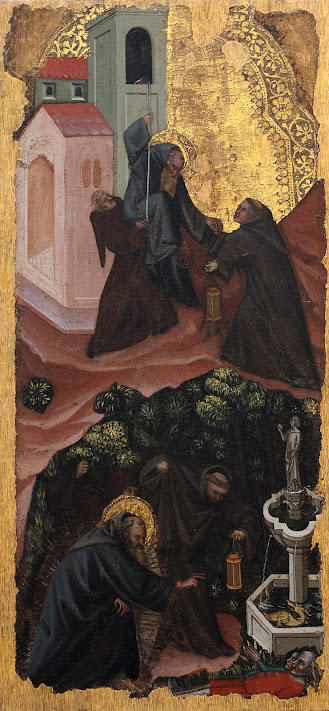 |
| St. Anthony of the Desert Today's Readings (Audio) |
“Why do the disciples of John and the disciples of the Pharisees fast,
but your disciples do not fast?”
Fasting seemed like the thing which those with an intense level of commitment would do. It probably seemed to the people who questioned Jesus that there was an objective program for the formative of a disciple that anyone ought to follow, one that corresponded neither to the uniqueness of the person being formed, nor of that of the teacher who was helping to form them.
Jesus answered them,
"Can the wedding guests fast while the bridegroom is with them?"
The answer Jesus gave was interesting on many levels. In the first place we see that practices like fasting could no longer be measured out generically. There was not a simple program for the formation of a disciple in some abstract sense that was appropriate for his disciples. He himself would need to be the center of his disciples formation. This meant that a dynamic relationship now took precedence over rigid protocols and practices. It meant that to try harder, to grit ones teeth, and to do the most one could was not always the appropriate response. Sometimes it was necessary to celebrate. This thing that set the schedule for this was nothing other than Jesus himself. It was no longer something disciples could dictate or decide apart from him.
As long as they have the bridegroom with them they cannot fast.
But the days will come when the bridegroom is taken away from them,
and then they will fast on that day.
We are now asked to fast by the Church, on Fridays, especially during Lent, and to practice fasting and abstinence on Ash Wednesday and Good Friday. But, although these tend to stick in our minds the most, we are asked to feast much more. All of the Sundays, Solemnities, and especially the holy seasons of Easter and Christmas all invite us to rejoice. The criteria is now nothing other than celebrating the presence of Jesus or in entering into the ways he is not yet fully present in our world with holy fasting. We are free to choose to fast above and beyond what the Church asks of us, and indeed this is laudable. But it should never be something that we simply grit our teeth and decide to do to perfect ourselves. It isn't that such an approach lacks all value or does nothing to help us grow in virtue. It is rather that fasting can now be so much more for us. I can be something that is inherently relational, that maintains, strengthens, and grows our connection to the bridegroom himself.
This new way of fasting that Jesus taught helps us avoid the risk to which Saul succumbed in today's first reading. He did what the Lord had commanded he not do and disguised it in a pretense of spirituality and religion. It is all too easy to simply do what we want and find a way to give at a veneer or religiosity. We give in order to obscure the way in which we first got. We surrender in order to obscure that to which we still cling. We fast in order to look impressive or so that we feel too weakened by the fast to serve. We give all of our time to prayer so that we are not available when others need us. Or we give all of our time to others to avoid the stillness and conviction that can come in quality time with the Lord. Freedom from all of these temptations is found by focusing on the proximity of the bridegroom.
Likewise, no one pours new wine into old wineskins.
Otherwise, the wine will burst the skins,
and both the wine and the skins are ruined.
Rather, new wine is poured into fresh wineskins.
We need Jesus to refashion us, to make us capable of containing the living water of the Spirit, the new wine of his Passion, that he wants to pour into us. This is the very thing he delights to do, making us new creations in him by the power of his resurrection. The new criteria is that of the obedience of faith, coming from the heart. This is what Mary invited those at Cana to experience in order to prepare themselves for to receive wine from Jesus. It wasn't yet fully time for them to have it because the new vessels that could hold it had not yet be refashioned by the death of Jesus. But because the bridegroom was present a preview tasting was indeed possible because faith opened the door. Much more deeply, then, are we invited to drink, and not only to drink, but to become containers of this wine, wine the world lacks but for which it never ceases to long.
No comments:
Post a Comment